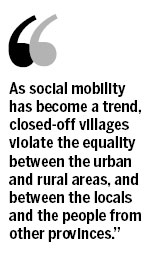
|
A security guard checks the ID of a migrant worker at the gated entrance of Shoubaozhuang village in Daxing district on Monday. [Han Meng /for China Daily] |
Beijing is toying with the idea of closing off those villages where most residents are migrant laborers. The gated and walled-in communities will be open from 6am until 11pm. People will be able leave during other times only in extraordinary circumstances.

According to Daxing police who are running a pilot project, they and other local government departments will jointly build walls, gates, guard posts and close rarely used roads, to turn the villages into walled-in communities.
The police have been concerned about security issues. It's understandable for them to step up patrols and surveillance cameras in the areas of the city known for high crime rates, but closing off the villages is an unwise move.
Not long ago, Beijing raised the idea of developing a "global city", with openness its key feature. Such a "global city" would be hard to imagine if we tolerate ubiquitous gated and well-guarded villages in the rural areas.
The police probably believe that there is a similarity between the closed-off villages and gated communities in the city. But in reality, they are quite different from each other.
City residents choose the gated communities on a voluntary basis. Nobody can force the homeowners to have a pass or impose restrictions on their movement. If the security measures affect their lives, the property management company would be fired.
However, in the closed-off villages, the villagers are under control and their activities restricted. Residents have no say in the matter, even if their lives are affected, because security is the top priority.
It's true that security looks inadequate in some villages where migrant residents stay. But administrators should not assume everybody is culpable because a small number of people are committing crimes.
As social mobility has become a trend, closed-off villages violate the equality between the urban and rural areas, and between the locals and the people from other provinces.
Administrators should also consider the increased social costs due to sudden interruptions of normal lives because of the walls and gates. While ordinary people cooperate with the government, how are the police helping them with such measures?
I believe such moves are, at the best, a temporary solution rather than a permanent cure. The police and government staff should take better care of residents and treat them equally. Only by doing so, can they prevent crimes and build up safe and healthy communities.
If every public area builds walls and issues passes in the name of security management, our city divided by fortresses will no longer look like a modern city.
At a time of great social change, local officials should embrace modern ideas, instead of sticking to an outdated, closed mentality.
Excerpts of a comment that first appeared in Beijing News on April 27.
Another view
Walled-in management admirable
by Pang Lan
Closed-off management is being implemented in pilot villages where migrant residents out-number permanent residents in Daxing district. Tang Jun, a researcher with Chinese Academy of Social Sciences, believes that closing off the villages makes everybody living in the communities culpable of crimes. However, I disagree with what Tang said, whether or not it is presumption of guilt.
Closed-off management is normally a feature of high-end communities that charge expensive property administration fees. The community where I live charges only 0.8 yuan per sq m for property administration fee, so its front and back doors are open all the time and security guards won't bother to question any visitor. And we can do nothing about it.
But every coin has two sides. For instance, the authorities in a city once gave every public servant two pot plants and required them to put it on their balcony at home. Some people said this was public power infringing on private power, while others say free pot plants is in public servant's welfare.

It is the same with the gated and walled-in villages. From the perspective of effect, it's apparently a good thing for residents to enjoy the security brought by closed-off management without paying expensive property administration fees, a fact that will make even those Beijingers who complain about irresponsible security guards feel jealous.
Of course, such a management method is still in its pilot phase, and there's room for further improvement.
Related media reports have shown that those who live in the gated villages are for it, but those who do small business in the villages have some concerns.
Take a steamed-bread seller for example, his customers are not just villagers, workers in factories nearby are also his main customers. Closing off the village will definitely have an impact on his business.
Besides salary earners who live in ordinary communities, some rich people living in villas might also envy Daxing villagers for having access to this kind of management because in some so-called "high-end" communities, the closed-off management just targets those who are sloppily dressed.
If you are dressed well and walk in the entrance in a cocky manner, or drive a luxury car, the security guards will just smile at you without checking if you have an entrance pass or not.
For example, an April 24 report in Yangtze Evening Newspaper said that a scene from the movie A World Without Thieves became real in Nanjing - where a thief entered a villa and stole the resident's safe, put it in the resident's Mercedes Benz and drove away. All the security guard did was salute
Those who drive luxury cars are not necessarily good people, so no matter whether or not it's an area where a floating population congregates, closed-off management is a practice which makes residents feel safe and easy.
Just as Peking University professor Lu Jiehua said in an interview, the population management method that best suits current social development is to offer all permanent residents property management-style community services, instead of differentiating hukou holders from non-hukou holders.
Management is built on the foundation of service and it needs to come along with service.
Excerpts of a comment that first appeared in Mirror Evening News on April 27.